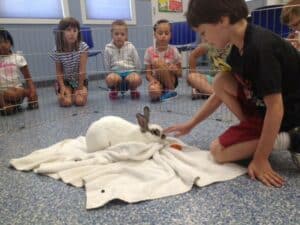Pets stimulate and enrich children’s learning experience
ARLINGTON, Va. (August 12, 2014)—Pets make great teachers; benefiting both children’s’ cognitive and social development. As back-to-school approaches, the Animal Welfare League of Arlington offers lessons that can be learned from shelter animals, whether it is through adopting a new study buddy, fostering shelter animals, or becoming a junior volunteer with the League.
“There are enormous opportunities for learning through the process of caring for a pet,” said Jennifer Pickar, director of community programs at the Animal Welfare League of Arlington. “By interacting with animals children not only learn about traditional school subjects like science (how and when the animal moves, what it eats, where it sleeps) and literacy (develop confidence with reading out loud to a nonjudgmental audience), but they also learn valuable life skills.
Pets help to teach and enrich children’s life-lesson experience by:
Building Confidence: Caring for a pet can give a child a sense of pride and accomplishment. Studies conducted by the Waltham Centre have shown that children with pets have higher levels of self-esteem than those without pets. The bond children develop with their pet can help to strengthen their social skills and improve attention spans, giving them the potential to do better in a school.
Teaching Responsibility: Whether it is filling the dog bowl with food or scooping the litter box, it is never too early for kids to learn proper animal care and what it means to be responsible for another living being. According to the American Pet Product Association’s 2011-2012 National Pet Owners Survey, 58 percent of pet owners said their pets helped to teach their kids to be responsible.
Encouraging Empathy: Caring for an animal can create awareness of the feelings and needs of others—both animal and humans. According to the American Academy of Child & Adolescent Psychiatry, “A child, who learns to care for an animal, and treat it kindly and patiently, may get invaluable training in learning to treat people the same way.”
“Adopting, fostering or becoming a Junior Volunteer with AWLA is a great way to develop respect and compassion for living creatures,” said Pickar. “Children between 10 and 18-years-old may volunteer for certain assignments, if they are accompanied by a parent.”
Lessons in responsible pet care and respect for animals can also be a part of the classroom experience without a live, classroom pet. Animal welfare experts and humane educators at the Animal Welfare League of Arlington are available to visit Arlington classrooms and give students valuable information about animals and their care. School groups from the D.C. metro area are also encouraged to visit AWLA for an information session and a tour.
To learn more about becoming a junior volunteer or to view AWLA’s diverse selection of adoptable “study buddies,” visit www.awla.org. To arrange an information session or tour of AWLA contact, Jennifer Pickar, jpickar@awla.org or 703/931-9241 ext. 213.



